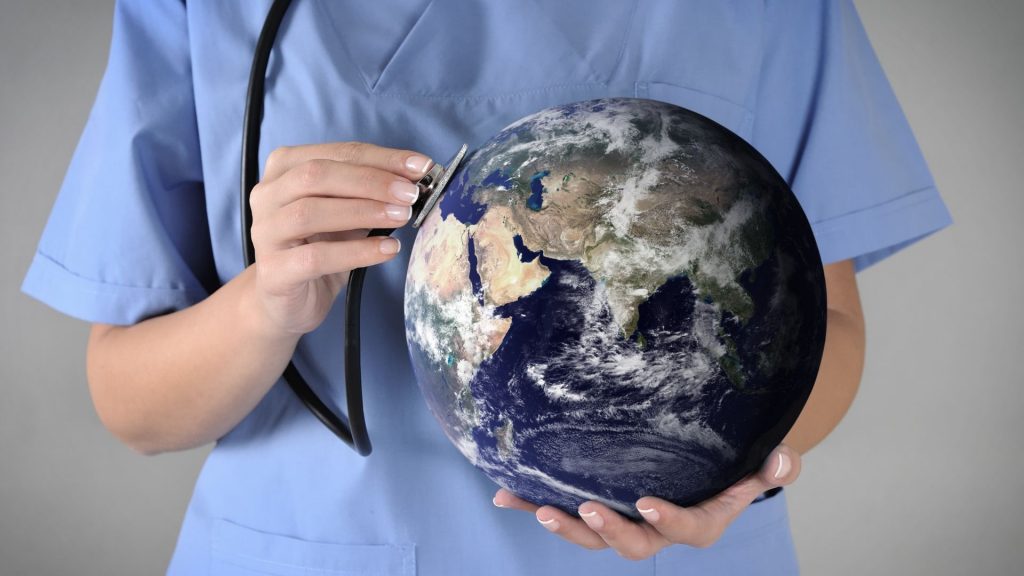We tend to look at health from our perspective, and how our health is affected, or how we can improve our health. But it is also useful to look at the bigger health picture around the world. It helps to understand the systemic structure of global health and how it affects us, and our communities. The COVID-19 pandemic has crowded out many aspects of global health from daily discourse. But it has highlighted some of the structural, policy and operational difficulties in creating and maintaining a healthy world. And we can only be truly healthy in a healthy world.
Health services are lagging further and further behind. National governments have a challenge ahead in correcting this and other service shortcomings for people living with disabilities.
10. Transforming healthcare
Covid-19 has changed so many aspects of our lives, mostly with negative outcomes. But there are ways in which Covid-19 is bringing better healthcare. In the past, telemedicine was primarily used in providing services such as radiology, cardiology, and remote chronic care monitoring. However, lockdowns have forced healthcare workers and practitioners to come up with more creative solutions.
Telemedicine is increasingly being used to connect healthcare workers and patients. Video meetings are enabling healthcare workers to spend more time with patients, as they do not have to spend time on travel. Doctors are finding that online consultation is an effective and sustainable patient-care solution, which is likely to continue when the worst of Covid-19 has worn off.
Now is the time to embrace new approaches to healthcare, at the community, government and global levels. The problems have been laid bare, and we cannot continue as before. In the meantime, each of us should continue to take care of our health as best our resources can permit.
https://www.intrahealth.org/sites/ihweb/files/attachment-files/thefutureofhealthworkinafricareport.pdf
Related Post: Drink Plenty of Water
Despite some attempts by social media organisations, the spread of false information continues unabated. Scientists and government leaders around the world have less and less control over the spread of false information. Governments will have to address this while avoiding strong-arm censorship and accusations of suppressing the truth.
9. Disability
The plight of disabled people has worsened considerably as a result of Covid-19. https://www.massgeneral.org/news/coronavirus/Covid-19s-impact-on-people-with-disabilities
People living with disabilities have reported increased problems with rehabilitation, and see-through masks for lipreading. Previous challenges with documents in Braille, or large print, sign language services, captions, audio, and graphics have made their position more difficult.
Health services are lagging further and further behind. National governments have a challenge ahead in correcting this and other service shortcomings for people living with disabilities.
10. Transforming healthcare
Covid-19 has changed so many aspects of our lives, mostly with negative outcomes. But there are ways in which Covid-19 is bringing better healthcare. In the past, telemedicine was primarily used in providing services such as radiology, cardiology, and remote chronic care monitoring. However, lockdowns have forced healthcare workers and practitioners to come up with more creative solutions.
Telemedicine is increasingly being used to connect healthcare workers and patients. Video meetings are enabling healthcare workers to spend more time with patients, as they do not have to spend time on travel. Doctors are finding that online consultation is an effective and sustainable patient-care solution, which is likely to continue when the worst of Covid-19 has worn off.
Now is the time to embrace new approaches to healthcare, at the community, government and global levels. The problems have been laid bare, and we cannot continue as before. In the meantime, each of us should continue to take care of our health as best our resources can permit.
https://www.intrahealth.org/sites/ihweb/files/attachment-files/thefutureofhealthworkinafricareport.pdf
Related Post: Drink Plenty of Water
[/vc_column_text][/vc_column][/vc_row]
Food insecurity brings significant health challenges in the form of nutrition-related preventable diseases. The health workforce will have to be equipped and skilled to deal with health services relating to climate change. Like Covid-19, climate change ignores national boundaries. Governments will have to collaborate to attack climate change consistently and take account of the human health consequences of the current situation. https://protect-za.mimecast.com/s/5W2mCy85xQC0g61uMDOwj?domain=dailymaverick.co.za
8. Fake news and conspiracy theories
Misinformation has become a more prevalent world phenomenon. Reckless theories are being put forward: masks are useless, 5G mobile phone towers cause Covid-19, Covid-19 is a hoax, the vaccines change your RNA, a tracking microchip is implanted in your body when you are vaccinated, and other fanciful conjectures.
Despite some attempts by social media organisations, the spread of false information continues unabated. Scientists and government leaders around the world have less and less control over the spread of false information. Governments will have to address this while avoiding strong-arm censorship and accusations of suppressing the truth.
9. Disability
The plight of disabled people has worsened considerably as a result of Covid-19. https://www.massgeneral.org/news/coronavirus/Covid-19s-impact-on-people-with-disabilities
People living with disabilities have reported increased problems with rehabilitation, and see-through masks for lipreading. Previous challenges with documents in Braille, or large print, sign language services, captions, audio, and graphics have made their position more difficult.
Health services are lagging further and further behind. National governments have a challenge ahead in correcting this and other service shortcomings for people living with disabilities.
10. Transforming healthcare
Covid-19 has changed so many aspects of our lives, mostly with negative outcomes. But there are ways in which Covid-19 is bringing better healthcare. In the past, telemedicine was primarily used in providing services such as radiology, cardiology, and remote chronic care monitoring. However, lockdowns have forced healthcare workers and practitioners to come up with more creative solutions.
Telemedicine is increasingly being used to connect healthcare workers and patients. Video meetings are enabling healthcare workers to spend more time with patients, as they do not have to spend time on travel. Doctors are finding that online consultation is an effective and sustainable patient-care solution, which is likely to continue when the worst of Covid-19 has worn off.
Now is the time to embrace new approaches to healthcare, at the community, government and global levels. The problems have been laid bare, and we cannot continue as before. In the meantime, each of us should continue to take care of our health as best our resources can permit.
https://www.intrahealth.org/sites/ihweb/files/attachment-files/thefutureofhealthworkinafricareport.pdf
Related Post: Drink Plenty of Water
[/vc_column_text][/vc_column][/vc_row]
The Covid-19 lockdowns have disrupted health services. Many people have lost access to HIV treatment; family planning and reproductive health services; maternal and newborn care; and services to treat and prevent non-communicable diseases. We require planning and policy that can ensure the continued delivery of all health services despite other crises. https://improvingphc.org/maintaining-access-routine-and-essential-services
7. The human cost of our climate troubles
The World Meteorological Organisation has reported that 2020 was one of the hottest years on record during the hottest decade on record. https://public.wmo.int/en/media/press-release/2020-was-one-of-three-warmest-years-record Extreme weather events have become much more prevalent over the last 20 years.
For many citizens around the world, their living conditions do not promote a healthy existence. The United Nations has announced that 690 million people around the world did not have enough to eat, and this is exacerbated by the Covid-19 crisis. https://www.un.org/en/global-issues/food
Food insecurity brings significant health challenges in the form of nutrition-related preventable diseases. The health workforce will have to be equipped and skilled to deal with health services relating to climate change. Like Covid-19, climate change ignores national boundaries. Governments will have to collaborate to attack climate change consistently and take account of the human health consequences of the current situation. https://protect-za.mimecast.com/s/5W2mCy85xQC0g61uMDOwj?domain=dailymaverick.co.za
8. Fake news and conspiracy theories
Misinformation has become a more prevalent world phenomenon. Reckless theories are being put forward: masks are useless, 5G mobile phone towers cause Covid-19, Covid-19 is a hoax, the vaccines change your RNA, a tracking microchip is implanted in your body when you are vaccinated, and other fanciful conjectures.
Despite some attempts by social media organisations, the spread of false information continues unabated. Scientists and government leaders around the world have less and less control over the spread of false information. Governments will have to address this while avoiding strong-arm censorship and accusations of suppressing the truth.
9. Disability
The plight of disabled people has worsened considerably as a result of Covid-19. https://www.massgeneral.org/news/coronavirus/Covid-19s-impact-on-people-with-disabilities
People living with disabilities have reported increased problems with rehabilitation, and see-through masks for lipreading. Previous challenges with documents in Braille, or large print, sign language services, captions, audio, and graphics have made their position more difficult.
Health services are lagging further and further behind. National governments have a challenge ahead in correcting this and other service shortcomings for people living with disabilities.
10. Transforming healthcare
Covid-19 has changed so many aspects of our lives, mostly with negative outcomes. But there are ways in which Covid-19 is bringing better healthcare. In the past, telemedicine was primarily used in providing services such as radiology, cardiology, and remote chronic care monitoring. However, lockdowns have forced healthcare workers and practitioners to come up with more creative solutions.
Telemedicine is increasingly being used to connect healthcare workers and patients. Video meetings are enabling healthcare workers to spend more time with patients, as they do not have to spend time on travel. Doctors are finding that online consultation is an effective and sustainable patient-care solution, which is likely to continue when the worst of Covid-19 has worn off.
Now is the time to embrace new approaches to healthcare, at the community, government and global levels. The problems have been laid bare, and we cannot continue as before. In the meantime, each of us should continue to take care of our health as best our resources can permit.
https://www.intrahealth.org/sites/ihweb/files/attachment-files/thefutureofhealthworkinafricareport.pdf
Related Post: Drink Plenty of Water
[/vc_column_text][/vc_column][/vc_row]
We need greater investment in health workforces and making policy changes to support and protect them. https://www.who.int/teams/health-workforce/health-professions-networks/
6. Continuity of essential health services
The Covid-19 lockdowns have disrupted health services. Many people have lost access to HIV treatment; family planning and reproductive health services; maternal and newborn care; and services to treat and prevent non-communicable diseases. We require planning and policy that can ensure the continued delivery of all health services despite other crises. https://improvingphc.org/maintaining-access-routine-and-essential-services
7. The human cost of our climate troubles
The World Meteorological Organisation has reported that 2020 was one of the hottest years on record during the hottest decade on record. https://public.wmo.int/en/media/press-release/2020-was-one-of-three-warmest-years-record Extreme weather events have become much more prevalent over the last 20 years.
For many citizens around the world, their living conditions do not promote a healthy existence. The United Nations has announced that 690 million people around the world did not have enough to eat, and this is exacerbated by the Covid-19 crisis. https://www.un.org/en/global-issues/food
Food insecurity brings significant health challenges in the form of nutrition-related preventable diseases. The health workforce will have to be equipped and skilled to deal with health services relating to climate change. Like Covid-19, climate change ignores national boundaries. Governments will have to collaborate to attack climate change consistently and take account of the human health consequences of the current situation. https://protect-za.mimecast.com/s/5W2mCy85xQC0g61uMDOwj?domain=dailymaverick.co.za
8. Fake news and conspiracy theories
Misinformation has become a more prevalent world phenomenon. Reckless theories are being put forward: masks are useless, 5G mobile phone towers cause Covid-19, Covid-19 is a hoax, the vaccines change your RNA, a tracking microchip is implanted in your body when you are vaccinated, and other fanciful conjectures.
Despite some attempts by social media organisations, the spread of false information continues unabated. Scientists and government leaders around the world have less and less control over the spread of false information. Governments will have to address this while avoiding strong-arm censorship and accusations of suppressing the truth.
9. Disability
The plight of disabled people has worsened considerably as a result of Covid-19. https://www.massgeneral.org/news/coronavirus/Covid-19s-impact-on-people-with-disabilities
People living with disabilities have reported increased problems with rehabilitation, and see-through masks for lipreading. Previous challenges with documents in Braille, or large print, sign language services, captions, audio, and graphics have made their position more difficult.
Health services are lagging further and further behind. National governments have a challenge ahead in correcting this and other service shortcomings for people living with disabilities.
10. Transforming healthcare
Covid-19 has changed so many aspects of our lives, mostly with negative outcomes. But there are ways in which Covid-19 is bringing better healthcare. In the past, telemedicine was primarily used in providing services such as radiology, cardiology, and remote chronic care monitoring. However, lockdowns have forced healthcare workers and practitioners to come up with more creative solutions.
Telemedicine is increasingly being used to connect healthcare workers and patients. Video meetings are enabling healthcare workers to spend more time with patients, as they do not have to spend time on travel. Doctors are finding that online consultation is an effective and sustainable patient-care solution, which is likely to continue when the worst of Covid-19 has worn off.
Now is the time to embrace new approaches to healthcare, at the community, government and global levels. The problems have been laid bare, and we cannot continue as before. In the meantime, each of us should continue to take care of our health as best our resources can permit.
https://www.intrahealth.org/sites/ihweb/files/attachment-files/thefutureofhealthworkinafricareport.pdf
Related Post: Drink Plenty of Water
[/vc_column_text][/vc_column][/vc_row]
Frontline health workers are overworked, understaffed, working without proper protection, and are experiencing overwhelmed intensive care units and skyrocketing death rates. https://www.afro.who.int/news/covid-19-halting-crucial-mental-health-services-africa-who-survey. Ordinary citizens experience similar personal mental health problems because of the disruption caused by lockdowns and Covid-related illness and death in their families and the workplace.
4. Public health and female leaders
From time to time the media points out that countries with female leaders have lower Covid-19 death rates, and have demonstrated better economic performance. https://www.theguardian.com/world/2020/aug/18/female-led-countries-handled-coronavirus-better-study-jacinda-ardern-angela-merkel
A study investigating how male-biased versus female-biased gender norms impact health reported that women’s health is better when women have leading roles in their communities. https://theconversation.com/womens-health-is-better-when-women-have-more-control-in-their-society-148327?utm_medium=email&utm_campaign=Daily%20Newsletter%201262021&utm_content=Daily%20Newsletter%201262021+CID_f3d02c307f608e581dd5af65f99e23c9&utm_source=campaign_monitor_us&utm_term=Womens%20health%20improves%20in%20societies%20where%20theyre%20the%20boss Women in leadership leads to better health. Gender equality takes on a new, urgent meaning.
5. Re-evaluating the role of healthcare workers
The Covid-19 pandemic has also exposed the problems confronting healthcare workers. They have made tremendous sacrifices but are not receiving the supplies, support, training and resources they need to respond to the pandemic appropriately, and to other health crises.
We need greater investment in health workforces and making policy changes to support and protect them. https://www.who.int/teams/health-workforce/health-professions-networks/
6. Continuity of essential health services
The Covid-19 lockdowns have disrupted health services. Many people have lost access to HIV treatment; family planning and reproductive health services; maternal and newborn care; and services to treat and prevent non-communicable diseases. We require planning and policy that can ensure the continued delivery of all health services despite other crises. https://improvingphc.org/maintaining-access-routine-and-essential-services
7. The human cost of our climate troubles
The World Meteorological Organisation has reported that 2020 was one of the hottest years on record during the hottest decade on record. https://public.wmo.int/en/media/press-release/2020-was-one-of-three-warmest-years-record Extreme weather events have become much more prevalent over the last 20 years.
For many citizens around the world, their living conditions do not promote a healthy existence. The United Nations has announced that 690 million people around the world did not have enough to eat, and this is exacerbated by the Covid-19 crisis. https://www.un.org/en/global-issues/food
Food insecurity brings significant health challenges in the form of nutrition-related preventable diseases. The health workforce will have to be equipped and skilled to deal with health services relating to climate change. Like Covid-19, climate change ignores national boundaries. Governments will have to collaborate to attack climate change consistently and take account of the human health consequences of the current situation. https://protect-za.mimecast.com/s/5W2mCy85xQC0g61uMDOwj?domain=dailymaverick.co.za
8. Fake news and conspiracy theories
Misinformation has become a more prevalent world phenomenon. Reckless theories are being put forward: masks are useless, 5G mobile phone towers cause Covid-19, Covid-19 is a hoax, the vaccines change your RNA, a tracking microchip is implanted in your body when you are vaccinated, and other fanciful conjectures.
Despite some attempts by social media organisations, the spread of false information continues unabated. Scientists and government leaders around the world have less and less control over the spread of false information. Governments will have to address this while avoiding strong-arm censorship and accusations of suppressing the truth.
9. Disability
The plight of disabled people has worsened considerably as a result of Covid-19. https://www.massgeneral.org/news/coronavirus/Covid-19s-impact-on-people-with-disabilities
People living with disabilities have reported increased problems with rehabilitation, and see-through masks for lipreading. Previous challenges with documents in Braille, or large print, sign language services, captions, audio, and graphics have made their position more difficult.
Health services are lagging further and further behind. National governments have a challenge ahead in correcting this and other service shortcomings for people living with disabilities.
10. Transforming healthcare
Covid-19 has changed so many aspects of our lives, mostly with negative outcomes. But there are ways in which Covid-19 is bringing better healthcare. In the past, telemedicine was primarily used in providing services such as radiology, cardiology, and remote chronic care monitoring. However, lockdowns have forced healthcare workers and practitioners to come up with more creative solutions.
Telemedicine is increasingly being used to connect healthcare workers and patients. Video meetings are enabling healthcare workers to spend more time with patients, as they do not have to spend time on travel. Doctors are finding that online consultation is an effective and sustainable patient-care solution, which is likely to continue when the worst of Covid-19 has worn off.
Now is the time to embrace new approaches to healthcare, at the community, government and global levels. The problems have been laid bare, and we cannot continue as before. In the meantime, each of us should continue to take care of our health as best our resources can permit.
https://www.intrahealth.org/sites/ihweb/files/attachment-files/thefutureofhealthworkinafricareport.pdf
Related Post: Drink Plenty of Water
[/vc_column_text][/vc_column][/vc_row]
Decolonisation has to consider white supremacy, racism, sexism and the economic production and distribution of goods and services across societies, and not within a narrow nationalist frame of reference. https://www.thelancet.com/journals/lancet/article/PIIS0140-6736(20)32763-X/fulltext
3. COVID-19’s toll on mental health
An unfortunate consequence of the Covid-19 lockdowns has been social isolation and an increase in mental illness. This has affected both the general public and healthcare workers and it has added stress to a health system that was already struggling to provide mental health services.
This has taken the form of depression, anxiety, drug use, burnout, and other stress-related illnesses.
https://www.kff.org/coronavirus-covid-19/issue-brief/the-implications-of-covid-19-for-mental-health-and-substance-use/#:~:text=A%20broad%20body%20of%20research,than%20among%20those%20not%20sheltering
Frontline health workers are overworked, understaffed, working without proper protection, and are experiencing overwhelmed intensive care units and skyrocketing death rates. https://www.afro.who.int/news/covid-19-halting-crucial-mental-health-services-africa-who-survey. Ordinary citizens experience similar personal mental health problems because of the disruption caused by lockdowns and Covid-related illness and death in their families and the workplace.
4. Public health and female leaders
From time to time the media points out that countries with female leaders have lower Covid-19 death rates, and have demonstrated better economic performance. https://www.theguardian.com/world/2020/aug/18/female-led-countries-handled-coronavirus-better-study-jacinda-ardern-angela-merkel
A study investigating how male-biased versus female-biased gender norms impact health reported that women’s health is better when women have leading roles in their communities. https://theconversation.com/womens-health-is-better-when-women-have-more-control-in-their-society-148327?utm_medium=email&utm_campaign=Daily%20Newsletter%201262021&utm_content=Daily%20Newsletter%201262021+CID_f3d02c307f608e581dd5af65f99e23c9&utm_source=campaign_monitor_us&utm_term=Womens%20health%20improves%20in%20societies%20where%20theyre%20the%20boss Women in leadership leads to better health. Gender equality takes on a new, urgent meaning.
5. Re-evaluating the role of healthcare workers
The Covid-19 pandemic has also exposed the problems confronting healthcare workers. They have made tremendous sacrifices but are not receiving the supplies, support, training and resources they need to respond to the pandemic appropriately, and to other health crises.
We need greater investment in health workforces and making policy changes to support and protect them. https://www.who.int/teams/health-workforce/health-professions-networks/
6. Continuity of essential health services
The Covid-19 lockdowns have disrupted health services. Many people have lost access to HIV treatment; family planning and reproductive health services; maternal and newborn care; and services to treat and prevent non-communicable diseases. We require planning and policy that can ensure the continued delivery of all health services despite other crises. https://improvingphc.org/maintaining-access-routine-and-essential-services
7. The human cost of our climate troubles
The World Meteorological Organisation has reported that 2020 was one of the hottest years on record during the hottest decade on record. https://public.wmo.int/en/media/press-release/2020-was-one-of-three-warmest-years-record Extreme weather events have become much more prevalent over the last 20 years.
For many citizens around the world, their living conditions do not promote a healthy existence. The United Nations has announced that 690 million people around the world did not have enough to eat, and this is exacerbated by the Covid-19 crisis. https://www.un.org/en/global-issues/food
Food insecurity brings significant health challenges in the form of nutrition-related preventable diseases. The health workforce will have to be equipped and skilled to deal with health services relating to climate change. Like Covid-19, climate change ignores national boundaries. Governments will have to collaborate to attack climate change consistently and take account of the human health consequences of the current situation. https://protect-za.mimecast.com/s/5W2mCy85xQC0g61uMDOwj?domain=dailymaverick.co.za
8. Fake news and conspiracy theories
Misinformation has become a more prevalent world phenomenon. Reckless theories are being put forward: masks are useless, 5G mobile phone towers cause Covid-19, Covid-19 is a hoax, the vaccines change your RNA, a tracking microchip is implanted in your body when you are vaccinated, and other fanciful conjectures.
Despite some attempts by social media organisations, the spread of false information continues unabated. Scientists and government leaders around the world have less and less control over the spread of false information. Governments will have to address this while avoiding strong-arm censorship and accusations of suppressing the truth.
9. Disability
The plight of disabled people has worsened considerably as a result of Covid-19. https://www.massgeneral.org/news/coronavirus/Covid-19s-impact-on-people-with-disabilities
People living with disabilities have reported increased problems with rehabilitation, and see-through masks for lipreading. Previous challenges with documents in Braille, or large print, sign language services, captions, audio, and graphics have made their position more difficult.
Health services are lagging further and further behind. National governments have a challenge ahead in correcting this and other service shortcomings for people living with disabilities.
10. Transforming healthcare
Covid-19 has changed so many aspects of our lives, mostly with negative outcomes. But there are ways in which Covid-19 is bringing better healthcare. In the past, telemedicine was primarily used in providing services such as radiology, cardiology, and remote chronic care monitoring. However, lockdowns have forced healthcare workers and practitioners to come up with more creative solutions.
Telemedicine is increasingly being used to connect healthcare workers and patients. Video meetings are enabling healthcare workers to spend more time with patients, as they do not have to spend time on travel. Doctors are finding that online consultation is an effective and sustainable patient-care solution, which is likely to continue when the worst of Covid-19 has worn off.
Now is the time to embrace new approaches to healthcare, at the community, government and global levels. The problems have been laid bare, and we cannot continue as before. In the meantime, each of us should continue to take care of our health as best our resources can permit.
https://www.intrahealth.org/sites/ihweb/files/attachment-files/thefutureofhealthworkinafricareport.pdf
Related Post: Drink Plenty of Water
[/vc_column_text][/vc_column][/vc_row]
Governments will need to address “vaccine nationalism,” a mindset of high-income countries, that, because they can afford it, they buy up many more doses than they need for their citizens, leaving other poorer countries short of supply.
https://issafrica.org/iss-today/vaccine-nationalism-and-african-government-deficiencies-hinder-roll-out
2. Decolonising global health
Vaccine nationalism is the most recent example in a long history of inequitable approaches to public health. Low-income countries often have to partner with high-income countries in healthcare. In many cases, the low-income countries were colonised by these high-income countries, and this colonial relationship is perpetuated in access to resources and technologies and healthcare practices.
This paternalistic top-down mindset has to change. We require a different approach to global governance, and the way resources are shared around the world. Little attention has been paid to the legacy of former colonial relationships and the influence they have on global health initiatives.
The way forward will require transformative learning approaches to promote change in attitudes and practice. This will be necessary to shift colonial paradigms toward more equitable partnerships in global healthcare.
Decolonisation has to consider white supremacy, racism, sexism and the economic production and distribution of goods and services across societies, and not within a narrow nationalist frame of reference. https://www.thelancet.com/journals/lancet/article/PIIS0140-6736(20)32763-X/fulltext
3. COVID-19’s toll on mental health
An unfortunate consequence of the Covid-19 lockdowns has been social isolation and an increase in mental illness. This has affected both the general public and healthcare workers and it has added stress to a health system that was already struggling to provide mental health services.
This has taken the form of depression, anxiety, drug use, burnout, and other stress-related illnesses.
https://www.kff.org/coronavirus-covid-19/issue-brief/the-implications-of-covid-19-for-mental-health-and-substance-use/#:~:text=A%20broad%20body%20of%20research,than%20among%20those%20not%20sheltering
Frontline health workers are overworked, understaffed, working without proper protection, and are experiencing overwhelmed intensive care units and skyrocketing death rates. https://www.afro.who.int/news/covid-19-halting-crucial-mental-health-services-africa-who-survey. Ordinary citizens experience similar personal mental health problems because of the disruption caused by lockdowns and Covid-related illness and death in their families and the workplace.
4. Public health and female leaders
From time to time the media points out that countries with female leaders have lower Covid-19 death rates, and have demonstrated better economic performance. https://www.theguardian.com/world/2020/aug/18/female-led-countries-handled-coronavirus-better-study-jacinda-ardern-angela-merkel
A study investigating how male-biased versus female-biased gender norms impact health reported that women’s health is better when women have leading roles in their communities. https://theconversation.com/womens-health-is-better-when-women-have-more-control-in-their-society-148327?utm_medium=email&utm_campaign=Daily%20Newsletter%201262021&utm_content=Daily%20Newsletter%201262021+CID_f3d02c307f608e581dd5af65f99e23c9&utm_source=campaign_monitor_us&utm_term=Womens%20health%20improves%20in%20societies%20where%20theyre%20the%20boss Women in leadership leads to better health. Gender equality takes on a new, urgent meaning.
5. Re-evaluating the role of healthcare workers
The Covid-19 pandemic has also exposed the problems confronting healthcare workers. They have made tremendous sacrifices but are not receiving the supplies, support, training and resources they need to respond to the pandemic appropriately, and to other health crises.
We need greater investment in health workforces and making policy changes to support and protect them. https://www.who.int/teams/health-workforce/health-professions-networks/
6. Continuity of essential health services
The Covid-19 lockdowns have disrupted health services. Many people have lost access to HIV treatment; family planning and reproductive health services; maternal and newborn care; and services to treat and prevent non-communicable diseases. We require planning and policy that can ensure the continued delivery of all health services despite other crises. https://improvingphc.org/maintaining-access-routine-and-essential-services
7. The human cost of our climate troubles
The World Meteorological Organisation has reported that 2020 was one of the hottest years on record during the hottest decade on record. https://public.wmo.int/en/media/press-release/2020-was-one-of-three-warmest-years-record Extreme weather events have become much more prevalent over the last 20 years.
For many citizens around the world, their living conditions do not promote a healthy existence. The United Nations has announced that 690 million people around the world did not have enough to eat, and this is exacerbated by the Covid-19 crisis. https://www.un.org/en/global-issues/food
Food insecurity brings significant health challenges in the form of nutrition-related preventable diseases. The health workforce will have to be equipped and skilled to deal with health services relating to climate change. Like Covid-19, climate change ignores national boundaries. Governments will have to collaborate to attack climate change consistently and take account of the human health consequences of the current situation. https://protect-za.mimecast.com/s/5W2mCy85xQC0g61uMDOwj?domain=dailymaverick.co.za
8. Fake news and conspiracy theories
Misinformation has become a more prevalent world phenomenon. Reckless theories are being put forward: masks are useless, 5G mobile phone towers cause Covid-19, Covid-19 is a hoax, the vaccines change your RNA, a tracking microchip is implanted in your body when you are vaccinated, and other fanciful conjectures.
Despite some attempts by social media organisations, the spread of false information continues unabated. Scientists and government leaders around the world have less and less control over the spread of false information. Governments will have to address this while avoiding strong-arm censorship and accusations of suppressing the truth.
9. Disability
The plight of disabled people has worsened considerably as a result of Covid-19. https://www.massgeneral.org/news/coronavirus/Covid-19s-impact-on-people-with-disabilities
People living with disabilities have reported increased problems with rehabilitation, and see-through masks for lipreading. Previous challenges with documents in Braille, or large print, sign language services, captions, audio, and graphics have made their position more difficult.
Health services are lagging further and further behind. National governments have a challenge ahead in correcting this and other service shortcomings for people living with disabilities.
10. Transforming healthcare
Covid-19 has changed so many aspects of our lives, mostly with negative outcomes. But there are ways in which Covid-19 is bringing better healthcare. In the past, telemedicine was primarily used in providing services such as radiology, cardiology, and remote chronic care monitoring. However, lockdowns have forced healthcare workers and practitioners to come up with more creative solutions.
Telemedicine is increasingly being used to connect healthcare workers and patients. Video meetings are enabling healthcare workers to spend more time with patients, as they do not have to spend time on travel. Doctors are finding that online consultation is an effective and sustainable patient-care solution, which is likely to continue when the worst of Covid-19 has worn off.
Now is the time to embrace new approaches to healthcare, at the community, government and global levels. The problems have been laid bare, and we cannot continue as before. In the meantime, each of us should continue to take care of our health as best our resources can permit.
https://www.intrahealth.org/sites/ihweb/files/attachment-files/thefutureofhealthworkinafricareport.pdf
Related Post: Drink Plenty of Water
[/vc_column_text][/vc_column][/vc_row]
Here are some of the big-picture issues that confront health worldwide.
1. The Global COVID-19 vaccine rollout
The COVID-19 pandemic has dominated health concerns worldwide. The pandemic has affected every country in the world. It has seen the fastest vaccine rollout in history, but it has not been done equitably. Many countries still do not have sufficient vaccines. High-income countries are well on their way to complete vaccine coverage, but most of the world’s countries are lagging behind.
The cost of vaccines will have to come down, and a more equitable distribution of vaccines will be necessary. Vaccine producers will need to do more to quickly manufacture and provide affordable vaccines.
Governments will need to address “vaccine nationalism,” a mindset of high-income countries, that, because they can afford it, they buy up many more doses than they need for their citizens, leaving other poorer countries short of supply.
https://issafrica.org/iss-today/vaccine-nationalism-and-african-government-deficiencies-hinder-roll-out
2. Decolonising global health
Vaccine nationalism is the most recent example in a long history of inequitable approaches to public health. Low-income countries often have to partner with high-income countries in healthcare. In many cases, the low-income countries were colonised by these high-income countries, and this colonial relationship is perpetuated in access to resources and technologies and healthcare practices.
This paternalistic top-down mindset has to change. We require a different approach to global governance, and the way resources are shared around the world. Little attention has been paid to the legacy of former colonial relationships and the influence they have on global health initiatives.
The way forward will require transformative learning approaches to promote change in attitudes and practice. This will be necessary to shift colonial paradigms toward more equitable partnerships in global healthcare.
Decolonisation has to consider white supremacy, racism, sexism and the economic production and distribution of goods and services across societies, and not within a narrow nationalist frame of reference. https://www.thelancet.com/journals/lancet/article/PIIS0140-6736(20)32763-X/fulltext
3. COVID-19’s toll on mental health
An unfortunate consequence of the Covid-19 lockdowns has been social isolation and an increase in mental illness. This has affected both the general public and healthcare workers and it has added stress to a health system that was already struggling to provide mental health services.
This has taken the form of depression, anxiety, drug use, burnout, and other stress-related illnesses.
https://www.kff.org/coronavirus-covid-19/issue-brief/the-implications-of-covid-19-for-mental-health-and-substance-use/#:~:text=A%20broad%20body%20of%20research,than%20among%20those%20not%20sheltering
Frontline health workers are overworked, understaffed, working without proper protection, and are experiencing overwhelmed intensive care units and skyrocketing death rates. https://www.afro.who.int/news/covid-19-halting-crucial-mental-health-services-africa-who-survey. Ordinary citizens experience similar personal mental health problems because of the disruption caused by lockdowns and Covid-related illness and death in their families and the workplace.
4. Public health and female leaders
From time to time the media points out that countries with female leaders have lower Covid-19 death rates, and have demonstrated better economic performance. https://www.theguardian.com/world/2020/aug/18/female-led-countries-handled-coronavirus-better-study-jacinda-ardern-angela-merkel
A study investigating how male-biased versus female-biased gender norms impact health reported that women’s health is better when women have leading roles in their communities. https://theconversation.com/womens-health-is-better-when-women-have-more-control-in-their-society-148327?utm_medium=email&utm_campaign=Daily%20Newsletter%201262021&utm_content=Daily%20Newsletter%201262021+CID_f3d02c307f608e581dd5af65f99e23c9&utm_source=campaign_monitor_us&utm_term=Womens%20health%20improves%20in%20societies%20where%20theyre%20the%20boss Women in leadership leads to better health. Gender equality takes on a new, urgent meaning.
5. Re-evaluating the role of healthcare workers
The Covid-19 pandemic has also exposed the problems confronting healthcare workers. They have made tremendous sacrifices but are not receiving the supplies, support, training and resources they need to respond to the pandemic appropriately, and to other health crises.
We need greater investment in health workforces and making policy changes to support and protect them. https://www.who.int/teams/health-workforce/health-professions-networks/
6. Continuity of essential health services
The Covid-19 lockdowns have disrupted health services. Many people have lost access to HIV treatment; family planning and reproductive health services; maternal and newborn care; and services to treat and prevent non-communicable diseases. We require planning and policy that can ensure the continued delivery of all health services despite other crises. https://improvingphc.org/maintaining-access-routine-and-essential-services
7. The human cost of our climate troubles
The World Meteorological Organisation has reported that 2020 was one of the hottest years on record during the hottest decade on record. https://public.wmo.int/en/media/press-release/2020-was-one-of-three-warmest-years-record Extreme weather events have become much more prevalent over the last 20 years.
For many citizens around the world, their living conditions do not promote a healthy existence. The United Nations has announced that 690 million people around the world did not have enough to eat, and this is exacerbated by the Covid-19 crisis. https://www.un.org/en/global-issues/food
Food insecurity brings significant health challenges in the form of nutrition-related preventable diseases. The health workforce will have to be equipped and skilled to deal with health services relating to climate change. Like Covid-19, climate change ignores national boundaries. Governments will have to collaborate to attack climate change consistently and take account of the human health consequences of the current situation. https://protect-za.mimecast.com/s/5W2mCy85xQC0g61uMDOwj?domain=dailymaverick.co.za
8. Fake news and conspiracy theories
Misinformation has become a more prevalent world phenomenon. Reckless theories are being put forward: masks are useless, 5G mobile phone towers cause Covid-19, Covid-19 is a hoax, the vaccines change your RNA, a tracking microchip is implanted in your body when you are vaccinated, and other fanciful conjectures.
Despite some attempts by social media organisations, the spread of false information continues unabated. Scientists and government leaders around the world have less and less control over the spread of false information. Governments will have to address this while avoiding strong-arm censorship and accusations of suppressing the truth.
9. Disability
The plight of disabled people has worsened considerably as a result of Covid-19. https://www.massgeneral.org/news/coronavirus/Covid-19s-impact-on-people-with-disabilities
People living with disabilities have reported increased problems with rehabilitation, and see-through masks for lipreading. Previous challenges with documents in Braille, or large print, sign language services, captions, audio, and graphics have made their position more difficult.
Health services are lagging further and further behind. National governments have a challenge ahead in correcting this and other service shortcomings for people living with disabilities.
10. Transforming healthcare
Covid-19 has changed so many aspects of our lives, mostly with negative outcomes. But there are ways in which Covid-19 is bringing better healthcare. In the past, telemedicine was primarily used in providing services such as radiology, cardiology, and remote chronic care monitoring. However, lockdowns have forced healthcare workers and practitioners to come up with more creative solutions.
Telemedicine is increasingly being used to connect healthcare workers and patients. Video meetings are enabling healthcare workers to spend more time with patients, as they do not have to spend time on travel. Doctors are finding that online consultation is an effective and sustainable patient-care solution, which is likely to continue when the worst of Covid-19 has worn off.
Now is the time to embrace new approaches to healthcare, at the community, government and global levels. The problems have been laid bare, and we cannot continue as before. In the meantime, each of us should continue to take care of our health as best our resources can permit.
https://www.intrahealth.org/sites/ihweb/files/attachment-files/thefutureofhealthworkinafricareport.pdf
Related Post: Drink Plenty of Water
[/vc_column_text][/vc_column][/vc_row]








